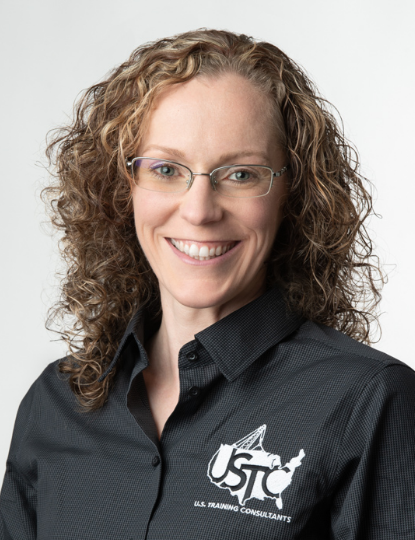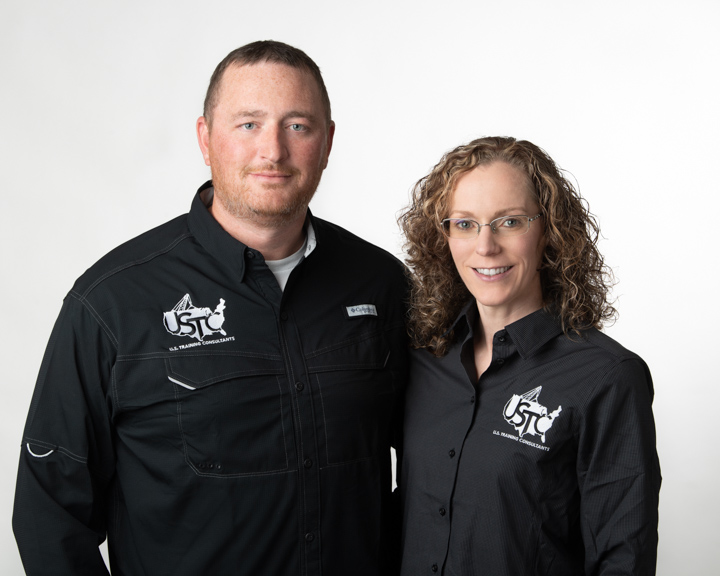About Us
U.S. Training Consultants, LLC is a Certified Women Owned Small Business located in Northeastern Pennsylvania that provides a variety of safety training services throughout the United States.
We are proud to be a Women-Owned Business with over 20 years of experience.
Meet Our
Leadership

Meet Jennifer
Jennifer Schmoyer, PE
CEO
Jennifer is responsible for USTC’s day-to-day operations, executing long and short-term goals, developing and maintaining our safety-training program, and overseeing client contracts, accounting, marketing, and client development. Before launching USTC with Brian in 2015, Jennifer worked as an Engineer, Stormwater Specialist, and Inspector for New York and Pennsylvania companies. She earned a BS in Civil Engineering from Rensselaer Polytechnic Institute and an MS in Civil Engineering from Syracuse University.

Meet Brian
Brian Schmoyer
President/Trainer
In addition to more than of decade of experience as a heavy equipment trainer, Brian has more than 20 years of experience (and counting) “in the seat” as an operator. He is accredited by NCCCO as a Practical Proctor; in the following CCO designations: Operator TSS, TLL, LAT, ABC, Signalperson, and Rigger 1&2; and certified by NCCCO as an Operator, Rigger, and Signalperson. Brian is an active member of several NCCCO and American Society of Mechanical Engineers (ASME) committees.

Our Story
The Story of USTC is also The Story of Us
U.S. Training Consultants is owned and operated by Jennifer and Brian Schmoyer. When you work with U.S. Training Consultants, you are not working with a faceless corporation — you are working directly with Jennifer and Brian, who are eager to hear from you and discuss how we can meet your training needs.
Our Capabilities
Critical training to help you prevent accidents and injuries.
Our classes provide the information you need to become OSHA Trained and/or NCCCO Certified and our programs can be customized for information for trainees at all experience levels — whether they are new or have 30+ years of experience.
Our comprehensive and expertly developed training sessions are presented in-person on your site by industry veterans with at least ten years of experience. They provide a theoretical and practical education in compliance with Occupational Safety and Health Administration (OSHA) regulations and American Society of Mechanical Engineers (ASME) standards.
Training is critical to prevent accidents and injuries on the job site! Operators, laborers, and pedestrians are injured each year in accidents that could have been prevented with proper training.
Q&A with
Jennifer
Jennifer Schmoyer, PE
Jennifer is USTC’s CEO
What got you interested in an engineering career?
I grew up in New York State in a small town along the Susquehanna River. While I was a teenager my community experienced several record storm events that caused a great deal of damage. This led me to be more interested in learning about what could be done to reconstruct and prevent future damage. I went on to study stormwater and geotechnical engineering in college and pursued this career afterwards.
What was your experience as a woman in a traditionally male-dominated field?
Being female never held me back. I grew up around farming with three brothers and one sister. It didn’t matter if you were a girl or a boy, the work had to get done! I did not feel like a pioneer when I got into engineering, although I was often the only woman on job sites. I was raised to be a confident, hard worker, which has really helped me in my career. If you can demonstrate your competence, people recognize and respect you — and your gender doesn’t matter, or at least it shouldn’t.
Why did you decide to leave engineering and launch USTC?
I had married Brian and he had shifted from operating equipment full time to also training operators. We began to pursue that together because we realized our interests intersected and aligned very well. He absolutely loves training — and he’s great at it! — and I love project management and everything else that comes with running a company.
Did you meet Brian in the course of your work?
Everyone thinks that would be the case, but no — we actually met in church!
How do you navigate the challenges of working so closely with your spouse?
I know that for some people the thought of working side-by-side with their husband or wife is not something they would ever consider, but it works out very well for us! We are both driven people and, while we work very well together, we have very different responsibilities. I run the business and do all the administrative work and he is responsible for the training. Having our own niches is probably the key to making it work for us.
What’s the most rewarding aspect of running USTC?
It’s knowing that everything we do helps keep operators and others safe — what could be more rewarding than that? And I get to work with many different kinds of training programs and manage logistics at client sites that have different requirements. I am always challenged and never bored. We always deliver on our promise to provide the highest-possible quality in our training programs delivered by highly experienced operators. We develop amazing relationships with our clients — which is also very gratifying.
Q&A with
Brian
Brian Schmoyer
Brian is USTC’s President and Trainer
What is the most satisfying aspect of training operators?
It’s wonderful to be able to draw on my more than two decades — and counting — of operator experience to help students become safer and better operators both in knowledge and practical education. Often, at the end of my classes, I’ll ask the class if anyone experienced what I call “ah ha” moments — when they realized they could immediately put something I shared to work making their job safer or help them do it better. Invariably, a few hands go up. I love that!
Does your operator experience help you connect with students?
Definitely. I’ve found that students can relate very well to someone with thousands of hours of experience “in the seat.” Not all trainers have experience as full-time operators. They might have safety degrees or sales experience — which is great, but they can’t share the practical experience in a class I’ve learned over the years, and which I keep learning, because I am still running equipment.
As an operator, do you have a favorite piece of heavy equipment?
I have three: cranes, excavators, and bulldozers — but of the three, I really enjoy running cranes the most.
As a boy playing in the sandbox, were you always pushing a bulldozer around?
Absolutely — I was always that kid! And as soon as I was old enough, I was running a backhoe and then on a skidder doing logging work, and I eventually got into construction — I am grateful for the opportunities I had in construction to get me to where I am today.
Why do you keep working as an operator rather than training full time?
My time in the seat is limited compared to training these days, however, when time allows working as an operator keeps me current with technology advances the same way that training ensures I am current with changes to regulations, laws, and guidance. Staying current is very important to me — which is also why I am so active with NCCCO and ASME committees. Technology is always changing, and safety standards are constantly being modified and new ones are being adapted, so I make an effort to keep up and know where our industry is going.
What’s the biggest challenge you face as a trainer?
Any teacher or trainer sometimes has students who just don’t want to be there. And sometimes companies send students who would rather be anywhere else. I have a couple of ways of dealing with that. One is by making my classes informal and even fun — and never boring! That engages the students and gives them a better chance of remembering the class material. If I sense someone has completely checked out, I will often make a point of stressing that, if nothing else, I hope they retain something out of the class. Being better informed is best, because if they ever see anything that could put someone’s safety in danger, they absolutely must say something. Because if they don’t, someone could be severely hurt or they could witness a fatality, that’s something that gets their attention.
